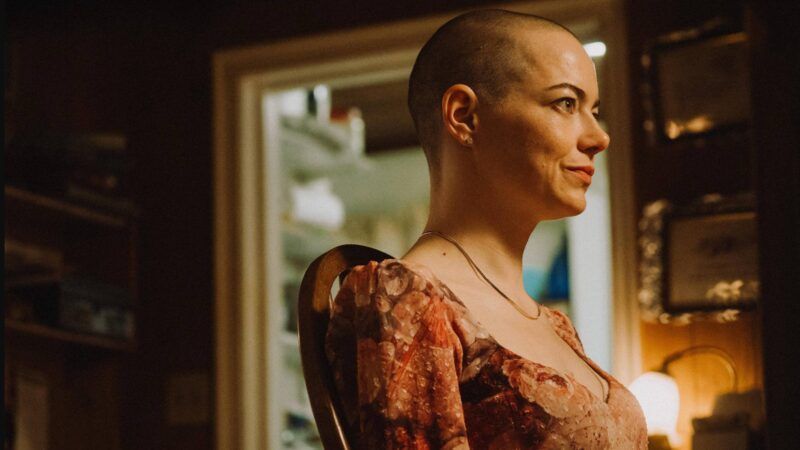In Yorgos Lanthimos' Bugonia, Elites Are Alien Creatures
A bleak, absurdist take on the gap between the world of HR corporate speak and ordinary Americans

As movies that diagnose the modern condition go, you can't do much better than Yorgos Lanthimos' Bugonia. Lanthimos has always been cold and caustic, proffering oddball metaphors for the absurd state of existence. But those fantastic metaphors have often been a little too on the nose, and his coldness has sometimes read as self-satisfied smugness. In Bugonia, his absurdist streak finally seems to have landed somewhere in the vicinity of the real world. Or maybe the real world just caught up.
The movie follows two young men, Teddy Gatz (Jesse Plemons) and Don (Aidan Delbis), as they plan and execute a plot to kidnap a corporate CEO, Michelle Fuller (Emma Stone).
Disheveled and disturbed, there is clearly something wrong with both men: Don is what press materials describe as neurodivergent, and he looks up to Teddy. Teddy, meanwhile, is clearly intelligent and possessed of a wild-eyed intensity. But after doing his research on YouTube, he's become obsessed with the idea that aliens have secretly invaded Earth, taking human form in an elaborate plot to experiment on humans. The two call themselves the human resistance. And they believe that Michelle is an alien.
What follows is, at heart, a series of exchanges between Teddy and Michelle. And their dialogue is a Lanthimos-ian metaphor for what's broken about the world. Teddy spouts a series of manic, intricate, crazed-seeming theories about alien control and techno-enslavement. He's gone deep on YouTube paranoia. Michelle responds by trying to talk to him like he's an equal in her elite corporate world, negotiating and making calm and rational arguments. Teddy is an amateur beekeeper and one of his arguments is that bee colonies have started to collapse; he blames corporate-alien mischief and fears humans will follow. When Michelle responds that colony collapse disorder is more complicated than the nefarious and hard-to-follow plot he imagines and notes, accurately, that bee colonies have actually revived in recent years, he refuses to listen. When this strategy fails, she tries to diagnose him as afflicted by internet misinformation. It's not his fault he's been fed these lies. Teddy responds that he's read all the New York Times essays, too. He doesn't want to be condescended to, in the language of a thinkpiece. He's read all of them, too. He doesn't buy it. She's an alien, and he knows it.
This is the movie's biting metaphorical conceit. They don't know how to talk to each other. With her extreme wealth, her polished corporate-HR language, her expectation that the grimy world of Teddy's basement will function like the gleaming glass world of her antiseptic corporate office, she really is like an alien. (That Teddy and Don have forcibly shaved her head, to prevent contact with her mothership, only adds to the effect.) Teddy and Michelle might as well be from different planets; they have incompatible ways of thinking, speaking, understanding, and being in the world. And they are both right about the baffling otherness of their interlocutor; She really is smug and unselfaware and superior in her ways—and he really is an erratic, paranoid, nobody obsessed with hairbrained ideas. Bugonia is a film about inequality, yes, but it's not really about haves and have-nots. Instead, it's about the unbridgeable cultural gap between these two people and their intertwined worlds.
As the film progresses, we see that there is more to the story. Teddy works a tenuous job in a shipping fulfillment center for the company Michelle runs. And they share a history together through his mother, who was harmed by a novel treatment for opioid addiction developed by that company. His father was never around. It's implied that a babysitter abused him. The movie doesn't quite go easy on Teddy. But if that were your life, the movie seems to ask, wouldn't you be a bit broken too?
The back-and-forth between the two forms the core of the film's second act, which spirals and escalates in madcap-yet-cogent ways. To a degree, the film resembles Fight Club, another bleak, satirical take on the modern condition that expanded and twisted its scenario in ways that weren't exactly realistic but were driven by a relentless internal coherence.
Like Fight Club, Bugonia probably won't be for everyone, at least at first. It's too dark, too unsparing, too grandiosely nihilistic, especially toward the end. But I found it thrilling, funny, and pointed—a movie that captures the contradictions of modern alienation by rendering it simultaneously plausible and absurd.


Show Comments (12)